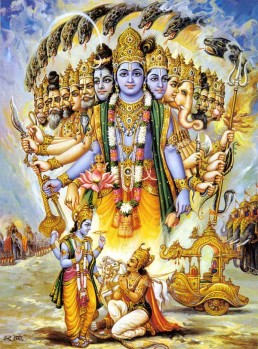Commentary
The reason why The Lord has shown the Cosmic Form to Arjuna only and to none else is given here. Devotion is the sole means to the realization of the Cosmic Form. In unbroken devotion which seeks none but The Lord alone, nothing other than The Lord is experienced by the sense organs wherein egoism and dualism totally vanish. Such experience by means of direct and immediate perception is what is called seeing in reality. ‘Entered into’ means that the devotee attains final liberation in the Lord after giving up the body. Thus the fulfilled seeker becomes the very essence of the sought.
Swami Chinmayananda
Swami Chinmayananda Commentary
The commentary on this verse and the rest, is avaialble for free as:
Kindle eBook
Google Play Book
Apple Books
Adi Sankara Commentary
Tu, but, O Arjuna; bhaktya, by devotion-. Of what kind? To this the Lord says: Ananyaya, by (that devotion which is ) single-minded. That is called single-minded devotion which does not turn to anything else other than the Lord, and owing to which nothing else but Vasudeva is perceived by all the organs. With that devotion, aham sakyah, am I able; evamvidhah, in this form-in the aspect of the Cosmic form; jnatum, to to known-from the scriptures; not merely to be known from the scriptures, but also drastum, to be seen , to be realized directly; tattvena, in reality; and also pravestum, to be entered into-for attaining Liberation; parantapa, O destroyer of foes. Now the essential purport of the whole scripture, the Gita, which is meant for Liberation, is being stated by summing it up so that it may be practised:
The Bhagavad Gita with the commentary of Sri Sankaracharya – Translated by Alladi Mahadeva Sastry
Holy Geeta – Commentary by Swami Chinmayananda
The Bhagavad Gita by Eknath Easwaran – Best selling translation of the Bhagavad Gita
The Bhagavad Gita – Translation and Commentary by Swami Sivananda
Bhagavad Gita – Translation and Commentary by Bhaktivedanta Swami Prabupadha
Srimad Bhagavad Gita Chapter 11 – Verse 54 – 11.54 bhaktya tvananyaya – All Bhagavad Gita (Geeta) Verses in Sanskrit, English, Transliteration, Word Meaning, Translation, Audio, Shankara Bhashya, Adi Sankaracharya Commentary and Links to Videos by Swami Chinmayananda and others – 11-54

